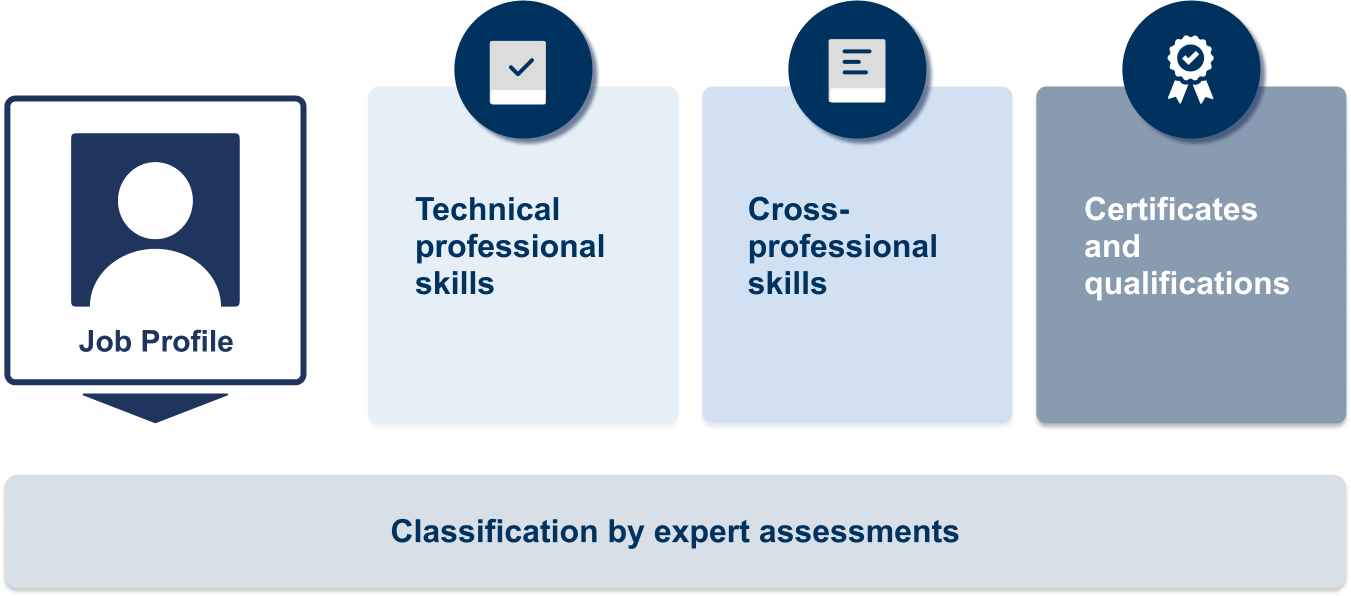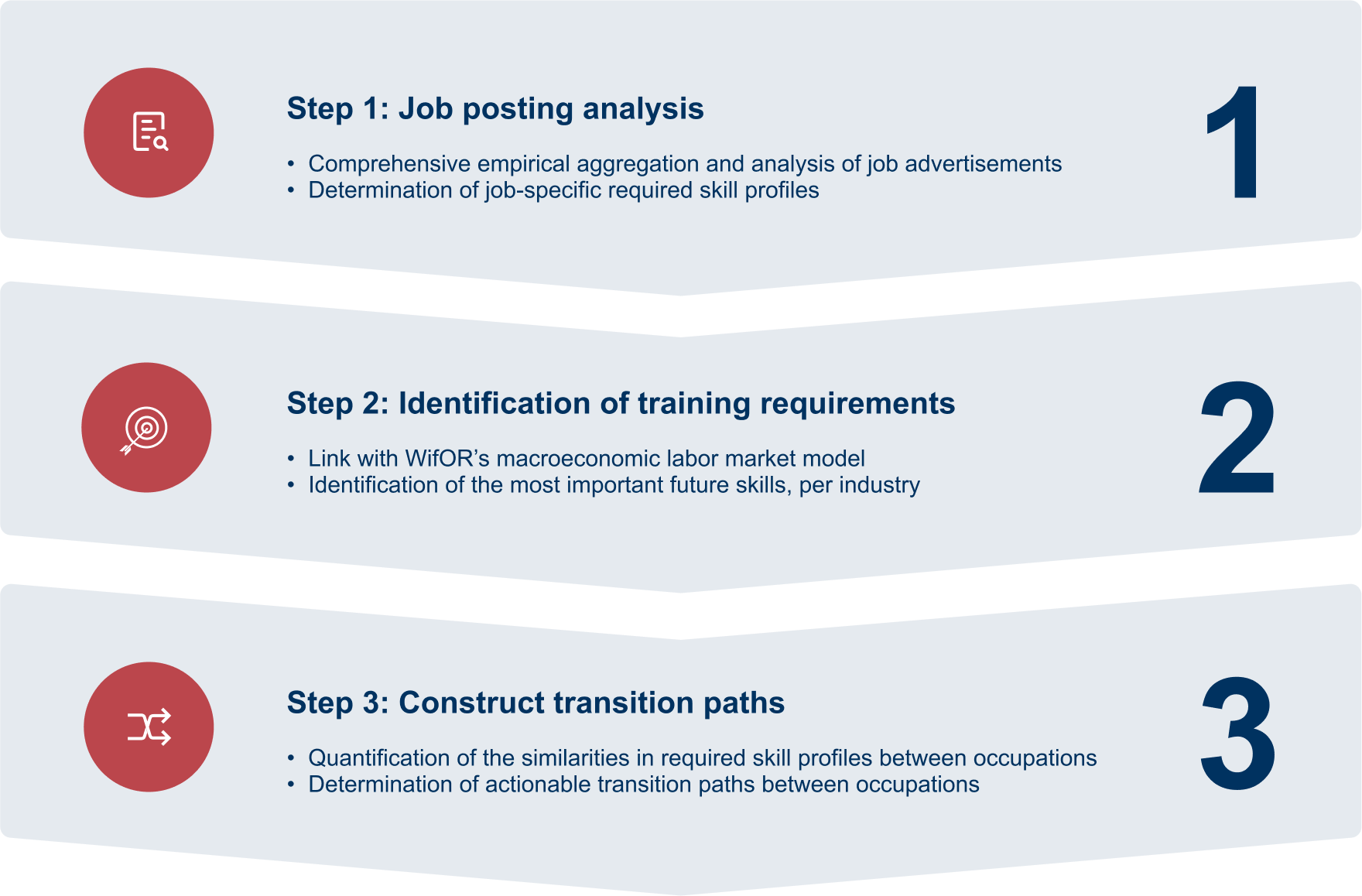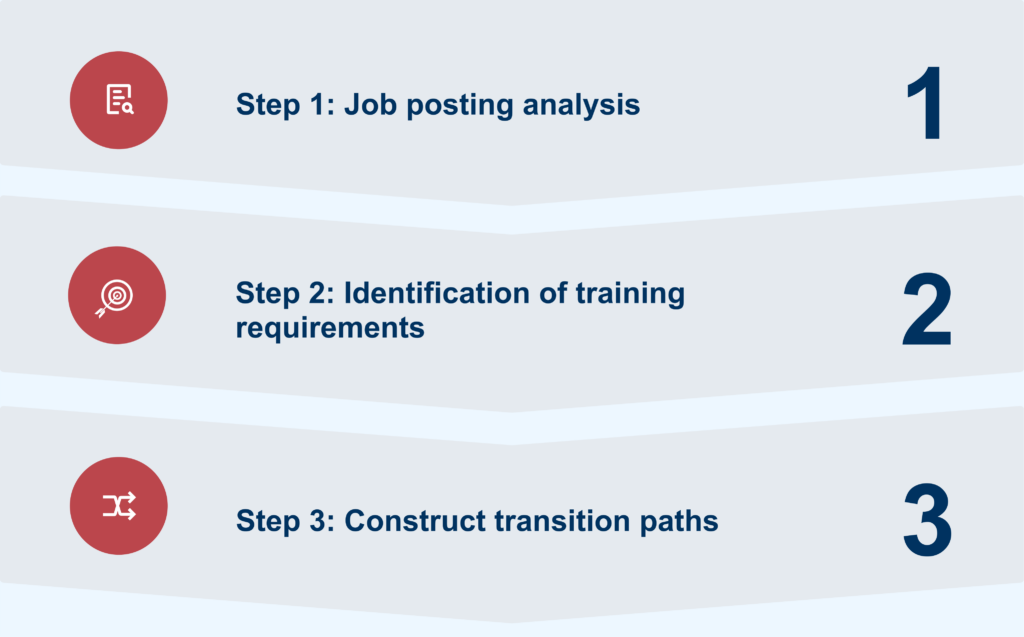The world of work is in a period of flux. By 2030, Germany’s workforce will shrink by around 4 million workers due to demographic changes. Meanwhile, advancements in technology are reshaping career development. According to the World Economic Forum, 83 million jobs are due to disappear worldwide by 2027, with 69 million new ones being created. But which skills are set to be in high demand for tomorrow’s workforce?
Using a skills gap analysis, companies and industries are able to identify key expertise for the (future) workforce – targeted to specific professions. This article explains how Big Data can be applied to a skills gap analysis with the aim of strategically recruiting, retaining, and developing employees. Results provide the foundation for evidence-based decision-making to meet critical and desired skill demands, thereby counteracting labor shortages.
Definition: Employee Skills
In scientific literature, the term “skills” has various definitions and is often used synonymously with “abilities”. Authors who make a distinction describe “skills” as an umbrella term for the range of abilities that enable people to handle complex and uncertain situations.
WifOR uses the following categorization of skill types to define required skill profiles and transition pathways:
- Technical professional skills: the specific skills and abilities that a person has acquired in their professional field.
- Cross-professional skills: general abilities, characteristics, and attitudes which are broadly applicable to many professions.
- Certificates and qualifications: official evidence of formal training or education, such as an academic degree or nursing qualification.

What is a skills gap analysis?
Gaps often exist between the skills available in a company’s workforce and the skills required to achieve business goals. A skills gap analysis identifies critical skills for a selected profession, examines available capabilities among employees and then quantifies missing skills in the present and future workforce. A skills gap analysis can be both specific to a company as well as cross-sectoral for entire industries.
Why is a skills gap analysis crucial?
Over the next five years, almost half of all the skills required of workers are expected to be disrupted, according to the WEF (2023). Future economic success is contingent on developing hard and soft skills into strategic HR planning as well as transition pathways for employees in obsolete professions.
Employee development
An important part of employee development for a company is understanding which technical abilities and expertise are present in a workforce and which are predicted to be absent in the future. Based on this information, companies and industries can provide targeted training in tandem with further education opportunities. This can offer employees an insight even if they are currently working in a profession that will no longer exist in the long term. At the same time, the results allow employees to adjust their profiles and advance their own careers.
Recruiting
A skills gap analysis can also enhance the recruitment process. It enables, for example, hiring managers to proactively identify skills which will be required in the future – and accordingly recruit individuals from talent pipelines who already possess these skillsets. This can simultaneously facilitate the process of integrating new employees into a company as well as increasing productivity. Additionally, a business strategy based on a skills gap analysis opens the door to recruiting individuals from professions with similarly required skills for hard-to-fill positions and investing in employee development using targeted training to support adaptation.
Retention
Competitive advantage is contingent on consolidated business strategies. Companies, and industries more broadly, can also apply a skill gap analysis to strengthen employee retention. Opportunities for career development that enable individuals to stay in the place of work promotes commitment and motivation over the long term. Alongside higher employee satisfaction, companies and industries can achieve business success by avoiding labor shortages, reducing employee fluctuation, and improving security in HR planning.
What is a Big Data Skills Analysis?
A classic “skills gap analysis” systematically determines a person’s abilities and knowledge. A Big Data Skills Analysis goes one step further: it considers not only the internal situation, but also the macroeconomic trends on the external labor market. It also identifies which expertise are required for selected professions. This approach is commonly adopted in HR planning to recruit, retain, and develop employees.
WifOR’s Big Data Skills Analysis addresses:
- Which skills will be particularly important over the upcoming years?
- Which skills will lose significance over the upcoming years?
- How can employee development be targeted to enable employees to transition from surplus to in-demand professions?
What are the benefits of applying Big Data for a Skills Analysis?
By integrating Big Data into a skills analysis, companies and sectors are able to incorporate the macroeconomic developments on the labor market into workforce strategies. Megatrends shaping the world of work include digitalization, demographic change/skilled labor shortages, and socio-ecological transformation. WifOR’s Big Data Skills Analysis maps current and future in-demand skills profiles with effective employee training as well as recruitment and retention measures.
How does a Big Data Skills Analysis work?
WifOR’s Big Data Skills Analysis follows a mixed method approach, structured in three steps. This approach is a quantitative analysis to determine the current and targeted professions on the labor market. Furthermore, WifOR applies its own databases, containing with several million job postings, which are constantly updated through web scrapings to assess the most recent labor market developments.
In the first step, WifOR determines the skill requirements according to the profiles for the selected professions. Using AI-supported analysis, the most important skills for each profession can be identified from ca. 50,000 relevant skills before being qualitatively classified.
In the second step, the job requirements are linked with a macroeconomic labor market model. Thereby, WifOR identifies the most important skills for the selected jobs in the future.
In the third step, WifOR determines similarities between job requirements in order to derive meaningful courses of action for companies. This enables the planning of recruitment and training measures based on the identified skill gaps.
Case Study: Transition Pathways in Automotive and Supplier Industry – Bertelsmann Stiftung
A Big Data Skills Analysis provides strategic recommendations for action to companies and industries. In a study commissioned by the Bertelsmann Foundation, WifOR applied a Big Data Skills Analysis to discover how employees affected by transformations in the automotive and supplier industry can transition into future-oriented professions.
Scope
Advancements in digital technology alongside, as well as socio-ecological transformation, pose substantial challenges to Baden-Württemberg’s automotive and supplier industry. As a result, many positions within the industry are predicted to experience a rapid decline in demand, while other professions are anticipated to become increasingly sought after. Using the Big Data Skills Analysis methodology, the study delivers concrete recommendations for action on skill gaps and worker transition pathways.
Results
From metal processing assistants and sales professionals to specialists in automotive and automation technology, industry transformations are anticipated to affect jobs spanning occupations and qualification levels.
Progress through vocational training for metalworking assistants
Transition paths have been defined for professions anticipated to experience a drop in demand. For example, a pathway has been identified which would see metalworkers transition into specialists in metal cutting – a profession essential to the digitalization of the industry. With a high level of compatibility between the occupations, a generalist in metalworking has the essential skill set to progress into a specialized worker, in the process securing a future-oriented career development.
Lateral shift for experts in technical R&D at the same requirement levels
Another pathway outlines a transition for experts in industrial R&D, such as a product engineer or automotive technologist, to specialize in microtechnology – a target profession with high labor shortages. The occupations require similar qualification standards, professional skills, and software knowledge. For a successful transition, workers would need to develop specialist skills in electronics engineering, computer programming, and digital display.
Progress through further training for sales managers
Similarly, the study identifies a transition path for salespersons to specialize in marketing and advertising. The transition does not require an additional diploma or formal training, instead a refocus on specific skills such as layout design and campaign management. A wide selection of mutual transversal skills exist between the occupations, including communication and selling capabilities.
Conclusion
These transition paths allow companies to specifically train their employees and offer them a future in the organization. As a result, companies can not only retain highly qualified staff but also ensure the long-term availability of skilled workers – thereby strengthening competitiveness.
In a nutshell: Big Data Skills Analysis
Business must prepare strategically for a series of megatrends, such as demographic change, digitalization, and socio-ecological transformation. A Big Data Skills Analysis provides actionable reference points for making scientifically based decisions in these dynamic circumstances. The skills gap analysis enables HR managers to develop employees according to evidence-based objectives, plan targeted recruiting measures, and offer employees long-term prospects – thereby proactively counteracting the shortage of skilled workers.









